Some Hanukka music from Charming Hostess
Jewlia Eisenberg shared these on Facebook. These were recorded in 2011 with Charming Hostess, then in 2015 with Book of J (Jewlia, Cynthia Taylor, and Jeremiah Lockwood)
Jewlia Eisenberg shared these on Facebook. These were recorded in 2011 with Charming Hostess, then in 2015 with Book of J (Jewlia, Cynthia Taylor, and Jeremiah Lockwood)
Ack! It is almost Khanike and I still have stacks of CDs that you should know about in case you have made gift-giving part of your seasonal celebration of light. Okay, let's get short bits up about a few of them, at least.
 From the clarinet glissando that opens the first song, first echoing Gershwin, then blasting that thought out of the ears, Benjy Fox-Rosens 2011 EP Tick Tock signalled a major shift in the way we think about Yiddish songs and Mordechai Geburtig's legacy. It is totally new all over again. "Yiddish Art Song" is reborn, in a thoroughly imaginative, beautiful manner. Listen, for instance to "Grine Oygen" (Green Eyes), which quotes from several popular klezmer and yiddish cliches, turning them inside out. I can only conclude by mentioning the title of the final song on the EP: "S'iz Git"—It's Good! You can get a copy of the EP in digital or physical form via BandCamp.
From the clarinet glissando that opens the first song, first echoing Gershwin, then blasting that thought out of the ears, Benjy Fox-Rosens 2011 EP Tick Tock signalled a major shift in the way we think about Yiddish songs and Mordechai Geburtig's legacy. It is totally new all over again. "Yiddish Art Song" is reborn, in a thoroughly imaginative, beautiful manner. Listen, for instance to "Grine Oygen" (Green Eyes), which quotes from several popular klezmer and yiddish cliches, turning them inside out. I can only conclude by mentioning the title of the final song on the EP: "S'iz Git"—It's Good! You can get a copy of the EP in digital or physical form via BandCamp.
 But, I really got you here to talk about the more recent 2014 Fox-Rosen release, Two Worlds, a reflective, sad song cycle comprised of reset songs by Mordechai Gebirtig. From the opening, "When father beats me," you know that this is not a shmaltzy picture of life in the old country. What makes this essential, and I think why I can't stop listening, is how real it is. The picture is so vivid, the music so intense, that I find myself at the end and starting over. Backed by his Yiddish Art Trio bandmates Pat Ferrell on accordion and Michael Winograd on clarinet, with his brother Avi on guitar and Tyshawn Sorey on drums, Benjy Fox-Rosen's voice and bass weave the arrangements into compelling, haunting stories. His music is new. But it is new swirled with traditional Yiddish folk, theatre, and klezmer fragments, recreated to make a vanished community real again, and to tug at our hearts, to make us care about that community and their lives, anew. You can get a copy for those amazing purveyors of wonderful new sounds, Golden Horn Records.
But, I really got you here to talk about the more recent 2014 Fox-Rosen release, Two Worlds, a reflective, sad song cycle comprised of reset songs by Mordechai Gebirtig. From the opening, "When father beats me," you know that this is not a shmaltzy picture of life in the old country. What makes this essential, and I think why I can't stop listening, is how real it is. The picture is so vivid, the music so intense, that I find myself at the end and starting over. Backed by his Yiddish Art Trio bandmates Pat Ferrell on accordion and Michael Winograd on clarinet, with his brother Avi on guitar and Tyshawn Sorey on drums, Benjy Fox-Rosen's voice and bass weave the arrangements into compelling, haunting stories. His music is new. But it is new swirled with traditional Yiddish folk, theatre, and klezmer fragments, recreated to make a vanished community real again, and to tug at our hearts, to make us care about that community and their lives, anew. You can get a copy for those amazing purveyors of wonderful new sounds, Golden Horn Records.
 Looking for something smooth, jazzy, uplifting for the holiday? David Chevan's Afro-Semitic Experience has just the thing, Souls on Fire. After several recent releases that focused on Jewish cantorial tradition, this year the band turned back to its roots, presenting songs from Pharaoh Sanders, MyCoy Tyner, Duke Ellington, along with traditional Jewish klezmer, and spirituals such as "Go Down, Moses" and "Avadim Hayinu" (We were slaves), from the Passover seder. Selections also include that gospel cantor, Sister Rosetta Tharpe's "Up above my head I hear music in the air." A perfect accompaniment to quiet evenings around the menorah or even a roaring fire. You can get your copy, digital or otherwise, from cdbaby.com.
Looking for something smooth, jazzy, uplifting for the holiday? David Chevan's Afro-Semitic Experience has just the thing, Souls on Fire. After several recent releases that focused on Jewish cantorial tradition, this year the band turned back to its roots, presenting songs from Pharaoh Sanders, MyCoy Tyner, Duke Ellington, along with traditional Jewish klezmer, and spirituals such as "Go Down, Moses" and "Avadim Hayinu" (We were slaves), from the Passover seder. Selections also include that gospel cantor, Sister Rosetta Tharpe's "Up above my head I hear music in the air." A perfect accompaniment to quiet evenings around the menorah or even a roaring fire. You can get your copy, digital or otherwise, from cdbaby.com.
 It is the rare holiday season when you can celebrate with a new release by the punk Eastern European rhythms of "Golem." This is one of them, and Tanz is the most fun the band has had in years. A frenzied cross between the Brave Combo, Gogol Bordello, and your neighborhood klezmer band, Golem's songs are pleasantly twisted, the rhythms are propulsive, dance-perfect. There is a lounge music component that keeps us from taking anything too seriously. Whether telling a plaintive story of two sad sacks finding each other and falling in love ("Miskayt"), harking back to the old country and the many changing linguistic contexts of modern life in "My Horse" ("but with my faithful horse, I speak mameloshn") or telling the stories of recent immigrants to the USA from the former USSR (most notably, sadly, on "Poletim," story of a hijacking gone a bit awry), this is a wonderful burst of energy and fun. This, and other fine recordings by the band are available from their website: golemrocks.com.
It is the rare holiday season when you can celebrate with a new release by the punk Eastern European rhythms of "Golem." This is one of them, and Tanz is the most fun the band has had in years. A frenzied cross between the Brave Combo, Gogol Bordello, and your neighborhood klezmer band, Golem's songs are pleasantly twisted, the rhythms are propulsive, dance-perfect. There is a lounge music component that keeps us from taking anything too seriously. Whether telling a plaintive story of two sad sacks finding each other and falling in love ("Miskayt"), harking back to the old country and the many changing linguistic contexts of modern life in "My Horse" ("but with my faithful horse, I speak mameloshn") or telling the stories of recent immigrants to the USA from the former USSR (most notably, sadly, on "Poletim," story of a hijacking gone a bit awry), this is a wonderful burst of energy and fun. This, and other fine recordings by the band are available from their website: golemrocks.com.
 A surprising amount of wonderful new Jewish music doesn't come from European Jewish traditions. Likewise, some of the most striking new music is old, as in this recreated Sephardic wedding song cycle arranged by Aron Saltiel, Ensemble Saltiel / Boda. There seems to be no comparable cycle in Ashkenazic tradition. Saltiel has combined decades of field research, with singers and musicians familiar with the repertoire, and takes us from a celebration of the first glances, to arranging the engagement, completing the bridal trousseau to the groom presenting a gift on the wedding night. Gathered from former Ottoman lands in the Balkans and Turkey, the melodies, the singing, and the sense of tradition are fantastic. The singing features for individual solos and a powerful Sephardic chorus. The CD is beautifully packaged with notes (including a brief introduction by Dr. Judith Cohen) and images, as well as translations of all of the tunes. This is just wonderful, good-time music, all the more precious for being a rare recording based on a vanishing/vanished tradition. You can get your copy, digital or otherwise, from Golden Horn Records.
A surprising amount of wonderful new Jewish music doesn't come from European Jewish traditions. Likewise, some of the most striking new music is old, as in this recreated Sephardic wedding song cycle arranged by Aron Saltiel, Ensemble Saltiel / Boda. There seems to be no comparable cycle in Ashkenazic tradition. Saltiel has combined decades of field research, with singers and musicians familiar with the repertoire, and takes us from a celebration of the first glances, to arranging the engagement, completing the bridal trousseau to the groom presenting a gift on the wedding night. Gathered from former Ottoman lands in the Balkans and Turkey, the melodies, the singing, and the sense of tradition are fantastic. The singing features for individual solos and a powerful Sephardic chorus. The CD is beautifully packaged with notes (including a brief introduction by Dr. Judith Cohen) and images, as well as translations of all of the tunes. This is just wonderful, good-time music, all the more precious for being a rare recording based on a vanishing/vanished tradition. You can get your copy, digital or otherwise, from Golden Horn Records.
 I saved my favorite among favorites for last. César Lerner and Marcelo Moguilevsky have been creating a wonderful fusion of Jewish and South American music together for almost as long as there has been a KlezmerShack. On their most recent (first?) trip to Boston two years ago, they brought Alef Bet, their most fully realized recording, yet. The album features their patented interplay between woodwinds and percussion/piano. Listen to Moguilevsky turn a simple "Zhok," first on flute?, and then Lerner's piano response, and then they begin improvising. "Una Luz" opens with quite, sparse chords by Lerner, and continues quietly exploring until the rapid pace of "Popurri" picks up Moguilevsky's clarinet and then the two are off, conversing wildly, excitedly, again. This is a quieter, more sure recording than their earlier efforts. It is less "klezmer-jazz fusion" and more it's own modern music in which one discerns strains of many things, but mostly, two musicians who have been sharing their conversations for decades, and who continue to find new, deeper, always-satisfying things to say to each other. Listening to Marcelo's whistling, as Lerner's piano walks quietly beside on the closing "Part of me," best expresses how far they have come, and how much richer our ears have been for the journey. Better, the days when ordering their CDs meant finding one's way in an Argentinian website and fantastic shipping charges are over. You can get this, and other recordings, directly from iTunes or Amazon.com
I saved my favorite among favorites for last. César Lerner and Marcelo Moguilevsky have been creating a wonderful fusion of Jewish and South American music together for almost as long as there has been a KlezmerShack. On their most recent (first?) trip to Boston two years ago, they brought Alef Bet, their most fully realized recording, yet. The album features their patented interplay between woodwinds and percussion/piano. Listen to Moguilevsky turn a simple "Zhok," first on flute?, and then Lerner's piano response, and then they begin improvising. "Una Luz" opens with quite, sparse chords by Lerner, and continues quietly exploring until the rapid pace of "Popurri" picks up Moguilevsky's clarinet and then the two are off, conversing wildly, excitedly, again. This is a quieter, more sure recording than their earlier efforts. It is less "klezmer-jazz fusion" and more it's own modern music in which one discerns strains of many things, but mostly, two musicians who have been sharing their conversations for decades, and who continue to find new, deeper, always-satisfying things to say to each other. Listening to Marcelo's whistling, as Lerner's piano walks quietly beside on the closing "Part of me," best expresses how far they have come, and how much richer our ears have been for the journey. Better, the days when ordering their CDs meant finding one's way in an Argentinian website and fantastic shipping charges are over. You can get this, and other recordings, directly from iTunes or Amazon.com.
I want to take time out for a few minutes to note the current season and mention a few recent releases that may help get you in the mood for t'shuvah.
 I'll first mention a new instrumental release by Tzadik saxophonist Paul Shapiro / Shofarot Verses. His 2003 "Midnight Minyan" put the daven into jazz. Here he continues that tradition, with some of my favorite Tzadik musicians, including Captain Beefheart alum Marc Ribot on guitar, Brad Jones on bass, and Tony Lewis on drums. From the opening moments of the very season-appropriate "Hashivenu" through the closing "With Reed and Skins" Shapiro manages to combine jazz and a sense of nusach (Ashkenazic Jewish cantorial modes) in ways that seek out that still small voice within us. At the same time, as on "Daven Dance," he reminds us that joy can physically move us. The shofar-like soprano sax impulsion on "Halil," with Ribot's answering guitar is one standout, followed by an actual shofar on "Ashamnu," which takes the familiar Yom Kippur melody to a new place of grace. The album's ethos is perhaps best expressed in the description of "Search your soul," "Finding solace in the house of b-flat." More info at Paul's website. The music is available from Tzadik and the usual disk and MP3 vendors online.
I'll first mention a new instrumental release by Tzadik saxophonist Paul Shapiro / Shofarot Verses. His 2003 "Midnight Minyan" put the daven into jazz. Here he continues that tradition, with some of my favorite Tzadik musicians, including Captain Beefheart alum Marc Ribot on guitar, Brad Jones on bass, and Tony Lewis on drums. From the opening moments of the very season-appropriate "Hashivenu" through the closing "With Reed and Skins" Shapiro manages to combine jazz and a sense of nusach (Ashkenazic Jewish cantorial modes) in ways that seek out that still small voice within us. At the same time, as on "Daven Dance," he reminds us that joy can physically move us. The shofar-like soprano sax impulsion on "Halil," with Ribot's answering guitar is one standout, followed by an actual shofar on "Ashamnu," which takes the familiar Yom Kippur melody to a new place of grace. The album's ethos is perhaps best expressed in the description of "Search your soul," "Finding solace in the house of b-flat." More info at Paul's website. The music is available from Tzadik and the usual disk and MP3 vendors online.
 Coming from another place, entirely, (and perhaps exemplifying the difference between the gritty downtown New York scene vs. the spiritual secularism of California's Bay Area) singer/cantor Linda Hirschhorn's voice and words speak directly to those parts of us that aspire to heal and to help a world in need of healing. Her 2013 recording, "Amazed" is also an album with beautiful personal love songs. With an all-star cast, including Holly Near on the backing vocals of the opening hymn, "Amazed," this is just a wonderful album, balm for a "verbissener velt." Tunes range from the folkie to the blues, as on "Some Love," to the hum along inspirational and aspirational, as "Give it all you have." You can listen to samples and purchase the CD from Linda Hirschhorn's website and the usual online vendors.
Coming from another place, entirely, (and perhaps exemplifying the difference between the gritty downtown New York scene vs. the spiritual secularism of California's Bay Area) singer/cantor Linda Hirschhorn's voice and words speak directly to those parts of us that aspire to heal and to help a world in need of healing. Her 2013 recording, "Amazed" is also an album with beautiful personal love songs. With an all-star cast, including Holly Near on the backing vocals of the opening hymn, "Amazed," this is just a wonderful album, balm for a "verbissener velt." Tunes range from the folkie to the blues, as on "Some Love," to the hum along inspirational and aspirational, as "Give it all you have." You can listen to samples and purchase the CD from Linda Hirschhorn's website and the usual online vendors.
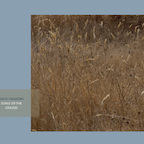 Siach Hasadeh is a Montreal-based duo, clarinet and bass, exploring Jewish niggun. Since they also appeared at Ashkenaz 2014, I can also link this set of reviews to my continuing coverage of the standout artists at that festival. Although the music is sweet, the duo explores the rougher sides of harmony as well. There is a delightful tone poem/art song/modern classical dissonance that weaves in and out of these tunes, from the opening "R' Levi Yitzchak Berditchever's Niggun" to "Niggun firn di tsaddikim in gay eyden" or "Rabbeinu's Niggun" featuring Shtreiml masters Jason Rosenblatt on harmonica and Ismail Fencioğlu on oud. For those who enjoy digging deeper and letter ways of niggun wash over them, this is a rich recording. You can read more about the recording on the band's website or purchase it directly from CDBaby.com.
Siach Hasadeh is a Montreal-based duo, clarinet and bass, exploring Jewish niggun. Since they also appeared at Ashkenaz 2014, I can also link this set of reviews to my continuing coverage of the standout artists at that festival. Although the music is sweet, the duo explores the rougher sides of harmony as well. There is a delightful tone poem/art song/modern classical dissonance that weaves in and out of these tunes, from the opening "R' Levi Yitzchak Berditchever's Niggun" to "Niggun firn di tsaddikim in gay eyden" or "Rabbeinu's Niggun" featuring Shtreiml masters Jason Rosenblatt on harmonica and Ismail Fencioğlu on oud. For those who enjoy digging deeper and letter ways of niggun wash over them, this is a rich recording. You can read more about the recording on the band's website or purchase it directly from CDBaby.com.
 The standout voice, the woman everyone wanted to hear at this year's Ashkenaz Festival was Polina Shepherd. Readers of these pages over the years will not be surprised—you have read reviews of her singing with choirs, with brass bands, with just her husband, Merlin Shepherd, and friends. She plays an amazing piano, but it is her voice that you notice. Amazing range. Beauty, and a force of nature. Born in the former Soviet Union, this recording is a tribute to both her Russian and Yiddish roots. She sings of love and longing, universal yearnings, whether, say, in the Russian "Silver Birch" or the more modern Yiddish of "Birch Tree;" from folk melodies, to Eastern European "scat," here a wordless prayer in "Ay Yay Yay;" whether the text comes from the Song of Songs, "Place me like a seal," her own poetry (most of these pieces), or evokes life, itself, in the Yom Kippur plea, "Avinu Malkeinu" (Our Father, Our King). Shepherd's voice is transformative. More information, and CD purchases from the artist's website.
The standout voice, the woman everyone wanted to hear at this year's Ashkenaz Festival was Polina Shepherd. Readers of these pages over the years will not be surprised—you have read reviews of her singing with choirs, with brass bands, with just her husband, Merlin Shepherd, and friends. She plays an amazing piano, but it is her voice that you notice. Amazing range. Beauty, and a force of nature. Born in the former Soviet Union, this recording is a tribute to both her Russian and Yiddish roots. She sings of love and longing, universal yearnings, whether, say, in the Russian "Silver Birch" or the more modern Yiddish of "Birch Tree;" from folk melodies, to Eastern European "scat," here a wordless prayer in "Ay Yay Yay;" whether the text comes from the Song of Songs, "Place me like a seal," her own poetry (most of these pieces), or evokes life, itself, in the Yom Kippur plea, "Avinu Malkeinu" (Our Father, Our King). Shepherd's voice is transformative. More information, and CD purchases from the artist's website.
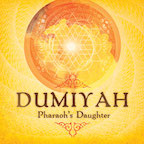
There has been an evolution as Basya Schechter has gone from writing Middle Eastern-inflected folksongs, to someone more involved with rethinking religious poetry. He most recent CD was a recording of her settings of love poems, both to women, and to God (and sometimes, like "Song of Songs," as easily to read as expressing love for both) written in Yiddish by Rabbi A. J. Heschel. This latest recording by Pharaoh's Daughter consists entirely of settings of traditional prayer and piyyut. The music, though, comes from around the world. The opening "Adon Olam" conveys echoes of electronica. The familiar "Maoz Tzur" is rethought with celesta-like keyboard pinpoints, as though to highlight falling snow; in the simplicity of the melody you can hear echoes of a family lighting Hanukkah candles. Likewise, "Ha-nerot Halaluh" contains elements of electronica and metallic percussion and a lively sing-along melody. The title song, for instance, "Dumiya," echoes all of the above, with hints of African rhythm and Middle Eastern flow. The closing "Shebishlifleynu" has a driving, somewhat psychedelic beat. The current season is evoked with light glissando's of sound setting "Zikaron," a poem conveying the awe of standing in front of G-d on Yom Kippur, with a quieter new melody for "P'tach lanu sha'ar" (open a gate for us). If the music of Shlomo Carlebach and Debbie Friedman simplified melodies and invited congregational participation in davenning in new ways, the music of Basya Schechter and Pharaoh's Daughter fuses Sephardic, Ashkenazic, and indeed, world music traditions for a new generation of prayers. It is good to hear such eloquent settings for songs of renewal in this season of awe. Liner notes and more info available on the Pharaoh's Daughter website. You can purchase a copy from Amazon.com
.
Sephardic-Jewish song, Flory Jagoda - Pesah ala mano (Passover is at hand) The amazing Flory Jagoda sings a Pesach classic.
This has been a wonderful week for music. I was too tired to attend the KlezWoods Christmas Klezmer Special (hint: holding me to attend events that begin at my bedtime is iffy), much as I would love to see them back where it all began, at the Atwoods Tavern in Cambridge. But they have neat shows planned for January (see the KlezmerShack world Jewish music calendar) so I am sure to see them soon.
But, this past Saturday night, motzei shabbes, I was treated to a rare local performance—the week's first house party by Alicia Jo Rabins. With her husband, Aaron, she presented a wonderful, midrashic evening full of "Girls in Trouble," including some very new stories that will be featured on a third album in the series. For those unfamilar with "Girls in Trouble," it is a program that grew out of a Masters Thesis at JTA in which Rabins tells the story of women in the Bible. Her use of both literal text and midrash to explicate the lives of women, both well-known (e.g., the prophetess Miriam) and obscure (Tamar), coupled with very American music make for a delicious concert To listen to midrash about Biblical women during this season of lights is also very special. Nah, the truth is, Girls in Trouble give good concert. The rest is just, um, midrash. You can find out more about the project at the Girls in Trouble website.
Wednesday night, we hosted Canadian ethnomusicologist Judith Cohen at our own home. As usually happens, people from all walks of life attended, and the event was just as lively for the conversations that took place after the lecture/performance as people discovered new connections amongst themselves, as for the event itself, which extended long past the scheduled stop time. Cohen reflected on her work in North Africa, Israel, Europe, and back home in Canada, gathering songs and stories. We followed the same song through several languages. We spent a lot of time on variants of the "guy goes off to war, comes back seven years later, and what happens when he tests his wife's faithfulness and feelings." Alas, in all of the variants, there appear to be none in which the woman says, "fuck you for abandoning me for seven years and then having the gall to test my fidelity get lost." There are, however, some in which she says, "well, too bad. I'm married with four kids now. Shoulda stayed home." It's a start.
As tends to happen when the speaker has done field research around the globe, she was also able to dig up songs from town and regions whence came several members of the audience. There were also some singalongs, and, happily, no performance of "Cuando el rey nimrod" (or other chestnuts). Cohen did point out that a song about the birth of the founder of the Hebrew people that refers to the "Jewish Quarter" does lack a certain amount of credibility, overall--but does reflect the song's own origins outside of Jewish tradition.
This morning, Henry Goldberg sent a list of links to follow up on some of the discussion. I post them here for those who were (or weren't) there, for following up further.
Judith did recover from her travels, and adds to the above:
Here's a link to one of my general articles on Sephardic music—most of my articles aren't online (or maybe they are and I just don't know—it happens.) This one is from the SIbE online journal TRANS (SIbE is Sociedad Iberica de Etnomusicología): www.redalyc.org/pdf/822/82220947013.pdf
From Eva Broman on the Jewish-Music list:
I just found this recording of some classic selichot that I'd like to pass on. They are sung by "Ha-project shel Revivo", a trio of young Yemenite singers that is very popular in Israel (and 230.000 hits for traditional religious songs is pretty good!):
And here is an article about the group: 'Revivo's Project' brings Mizrahi pop back to its Arab roots, by Ophir Toubul, March 11, 2013, 972Magazine
Eva Broman found this delightful article and posted to the Jewish-Music mailing list:
Seven Songs, Seven Identities: Bridging the Past and the Future, by Dr. Jane Mushabac, from Sephardic Horizons
"... Singing in traditional societies was very different. A traditional home was directly enlivened by song. Sephardic women sang regularly while busy with tasks and in social gatherings; their songs were full of pleasure, angst, bitterness, joy, and sexual innuendo. Men's singing was liturgical. At home and in synagogue, men's prayers and blessings celebrated Jewish history and coherence. For both women and men, singing was both easy and habitual, and physical and intense.… [more]
From George Robinson, to the Jewish-Music list, noting another great Tablet audio podcast by Sara Ivry:
Just wanted to pull your coat to an item at Tablet Magazine that will be of interest to list members:
The blog in question, Jewish Morocco, is here: jewishmorocco.blogspot.com
And I enthusiastically second Chris Silver's plug for "El Gusto" the documentary about Jewish Moroccan musicians today. Terrific film, great people, thrilling music.
George (Great film critic, thrilling music) Robinson
From Araceli Tzigane:
I get in touch with you to let you know about the Gibraltar World Music Festival. Its first edition will be held on day 9th of July, inside the Saint Michael's Cave, in the Rock of Gibraltar. This edition is dedicated to "Sephardic Divas" and the artists that will play there are Sarah Aroeste, Mor Karbasi, Françoise Atlan, and Ofir.
If you want to see the poster, it is available here: http://ofirelviaje.wordpress.com/2012/05/07/gibraltar-world-music-festival-9th-of-july-with-ofir/
I've been listening to the free "double EP" by this new ensemble with considerable interest. I'm not sure how to categorize it—obviously influenced by Balkan music, in general, and by modern electronica. Joe Sepharad sez, "check it out!"
I enclose a link to a new project The Sefiroth Ensemble. The group performs contemporary interpretations of traditional Sephardic music and we have just released a double-EP which available for free download here:
We will be performing at the Sephardic Music Festival in Brooklyn, NY this coming December so I am hoping to build a listenership in advance of our coming to the US.
Nick Roth,
Artistic Director,
Sefiroth Ensemble, London
E-mail Sefiroth.
From the Jewish-Music mailing list, Ates Temeltas writes (about a very exciting project from Aron Saltiel):
This video includes parts of a performance by Ensemble Saltiel¹s Sephardic Wedding Songs project.
More information about the project
To which Howard Eisenberger adds:
Bonjour a tous,
The 52 minute Paris concert of June 2011 can be found here. There is a download link for the audio.
Alexander Gelfand, a writer that I often admire, has a curious story in this week's Jewish Forward in which he laments the lack of remaining Jewish community in Istanbul. That is true—the Jewish community in Turkey in general, and Istanbul is much diminished. He doesn't mention, but I will, that even the Holocaust had an effect—witness Kurt Waldheim's nasty efforts to help eradicate the Jewish community of Salonica (since the collapse of the Ottoman Empire, part of Greece).
But there is so much that is exciting that still remains!
First read the article, "Lost Music of Istanbul's Sephardic Jews", from the Sep 9, 2011 edition, which also contains some excellent pointers to new Sephardic music in US and Israel. Then look at comments by Judith Cohen and myself (and others?). I'll repeat my own comments:
I have several as-yet-unreviewed Jewish recordings made in Istanbul in recent years. Notable among those that I have reviewed are a recording by Hadass Pal Yarden (who also seems to perform locally in Istanbul, and internationally), "Yahudije" or this kid's recording reviewed by Professor Judith Cohen in 2006, "Izzet Bana & Estreyikas d'Estambol / Un Kavretiko".
In short, although the Jewish community in Istanbul is much diminished, it has not vanished and there are some fascinating places still alive and worth exploring.
Credit Joel Bresler for spotting this article:
"Rosine Nussenblatt Flory Jagoda, a Jewish folk singer, has devoted her career as a musician to transmit her Sephardic Judeo-Spanish culture from Bosnia through her music and songs. She has told the history of her family in several venues, including in her songbook entitled: The Flory Jagoda Songbook: Memories of Sarajevo (1996). Here, she has recreated for us the life of her family in Vlasenica, a picturesque Bosnian mountain village where she grew up.
This interview was very informal, being conducted at Flory Jagoda’s apartment, in Arlington, Virginia, on February 19, 2010, around a cup of coffee and delicious homemade Sephardic delicacies, a real Sephardic vijita [visit]. "
Read the entire text of: Interview with American Sephardic Singer Flory Jagoda, by Rosine Nussenblatt in Sephardic Horizons
Eva Broman spotted this and posted to the Jewish-Music list:
A great website with two complete concerts of Judeo-Andalousian music:
www.akadem.org/sommaire/themes/liturgie/15/2/module_8917.php
It has long been a sad saying of mine that I have been useless at finding actual local gigs for friends who make wonderful music. This past fall, however, I helped get The Other Europeans to Somerville. On Saturday night, we serve a different form of excellent Jewish by hosting Toronto ethnomusicologist and frequent KlezmerShack contributor Judith Cohen at our home. Please join us in welcoming her in her first post 9/11 Boston-area appearance:
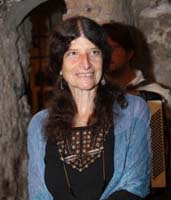 Judith Cohen ~ Sephardic Song
Judith Cohen ~ Sephardic Song
Saturday, December 18 · 7:30pm Newton, MA
Canadian ethnomusicologist Judith Cohen offers a wide-ranging repertoire of Jewish song, mixed with the stories behind the songs from her decades of field research in Spain,Portugal, and around the world.
This is a house concert. Light kosher refreshments will be provided. For address info, email Ari Davidow. Shuttle to/from Chestnut Hill T stop available.
Forwarded to me by a friend:
The 5th Annual Sephardic Music Festival, sponsored by NYC's 92nd Street Y Tribeca location, got off to a roaring start with a performance by Galeet Dardashti's group, "The Naming". Dardashti mixes English, Hebrew, Arabic and Persian in original musical compositions and songs about women. Her subjects range from the matriarchs to her Teheranian great-aunt Tova who was childless and therefore put on tefillin every morning since she felt she had no excuse for slacking, given that women are generally excused from the compulsory execution of this mitzvah by dint of needing to take care of their children. 'The Naming' has good electronics which help visualize the biblical or midrashic texts from which Dardashti crafts her songs. The musicians are more than competent; they are clearly interested in using traditional Persian Jewish music in a respectful way when it gets fused into more western traditions. Themes include Sarah and Hagar, the Queen of Sheba's riddles and hairy legs, childbirth, and a beautiful song about the city of Shusan which is also a paean to Vashti (today's demonstrators in Teheran and Jewish women are all seen as Vashti's offspring).
Smadar Levi was uplifting ; her band had a lot of good energy and she genuinely knew how to work the crowd in a mix of English and Hebrew. The emphasis was on Moroccan music that was clearly suffused not only with Jewish and Moroccan themes but also with Sufiism. She had just come back from the music festival at Fez where she apparently did a command performance for the Moroccan king. Her mix of languages in original songs set usually in both Hebrew and Arabic worked well. Her band felt like an updated version of HaBreira HaTivit and people by the end of the set were clapping and dancing since she clearly invited audience participation.
—Esther Malka
Oh, this is delicious—from Alain Mihaly :
Extrait du concert Jacques Franck en juin 2008. Zahava Seewald et Zohara interprètent : la chanson "Abulafiah, I would Lay down my life" compositeur J. Zorn sur un thème de Samuel Hanagid Extrait du concert Jacques Franck en juin 2008. Zahava Seewald et Zohara interprètent : la chanson "Abulafiah, I would Lay down my life" compositeur J. Zorn sur un thème de Samuel Hanagid
Peter of the Aaron Lebedeff site spotted this French-language site about Judeo-Arabic music from Algeria: yafil.free.fr. It contains pictures, biographies, old recordings, MIDI files, sheet music.
Eva Broman spotted this wonderful new set:
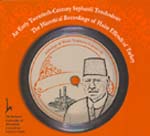 An Early 20th-century Sephardi Troubadour:
The Historic Recordings of Haim Effendi of Turkey
An Early 20th-century Sephardi Troubadour:
The Historic Recordings of Haim Effendi of Turkey
In 1907, the Odeon recording company in Turkey released the first record by Haim Effendi, one of the very earliest recordings of Judeo-Spanish music. The name of Haim Effendi (1853–1938) was known among devoted aficionados of Sephardic music, but to this day virtually none of his recordings were available to the general public. This re-release of almost 60 of Haim Effendi's songs offers the public a rare opportunity to hear his voice and appreciate the variety of his repertoire.
This new edition includes liturgical and paraliturgical pieces, romances and other songs in Judeo-Spanish from Turkey and the Balkans as they were recorded in the first three decades of the 20th century. In this format, these songs and prayers were probably heard in the private homes, synagogues, social gatherings and cafés of Sephardic Jews in the late Ottoman Empire.
The present recording was twenty years in the making and was made possible thanks to Joel Bresler, the founder of www.sephardicmusic.org. Bresler collected Haim Effendi's 78 rpm records from various sources and initiated their digitization. Dr. Rivka Havassy from Bar-Ilan University and Prof. Edwin Seroussi from Hebrew University added extensive notes on Haim's life and work.
Price: $30 (4 CDs plus 100 pp. booklet)
The recording is available at the “Eight Note” stores throughout Israel or
At the Jewish Music Research Centre through the website,
www.jewish-music.huji.ac.il, or by mail, at POB 39105, Jerusalem. Israel 91390. You can order by fax, at: 972-2-5611156
Joel Bresler adds: "The notes by Dr. Havassi and Prof. Edwin Seroussi are truly a landmark." Anyone who knows of the work of these scholars will find this likely to be an understatement.
I get so little news about Jewish life or celebrations in Europe, and even fewer fun to read, that I requested permission from Jewish ethnomusicologist/chanteuse extraordinaire, Judith Cohen to reprint this message sent this morning to the Jewish-Music mailing list about her recent travels with her daughter, Tamar Adams:
hi, I'm here and there in Rome and Spain without a lot of internet access. … Tamar and I had a few interesting experiences singing and giving workshops—all-Sephardic (with a touch of Balkan and Yiddish) in Rome—from our base housed by the organization who invited us—in what seemed to be a converted cell, at a convent hostal next to the Vatican and opening onto a wonderful open street fruit and vegetable market.. The little bespectacled Rumanian (originally) nun who directed the place could occasionally be spotted driving an equally little car, with fierce determination, in the mad traffic around the Vatican—once, from the bus, I caught sight of her caught in a typical Roman snarl of vehicles waving her arms in the air over the steering wheel and shouting (apparently) imprecations which, regretfully, I couldn;t hear…. She had also made an agreement with the scruffy little bar next door to give convent guests coffee and a croissant every morning, and, to their own surprise, they turned out to have wifi which the owner's son had installed and forgotten about.
I visited the main synagogue to look at it, very imposing, but someone suggested to me that the melodies were more interesting at the small synagogue very few people know exists (so I won;t say here on the list where it is); there were very few people at it for Kabbalat Shabbat but those who were there did indeed sing pleasant melodies very tunefully . If anyone's going to Rome and is interested, ask me offlist.
I happened to be in Madrid for the historical first-ever lighting of a Hanukia in a public space. The "Gran Rabino" (Sephardic) of Israel was there, and did the main berakhot, which the local main rabbi translated into Spanish, mostly for the benefit of the curious neighbourhood people walking babies and dogs in the twilight. The music was loud, blaring Israeli music blasted over loudspeakers—Israeli dance tunes and songs in pop arrnagements. Most Jews in Madrid are Sephardic, or if Ashkenazi often Argentinian, and automatically joining hands to dance a basic hora doesn;t seem part of their background. Especially since the most traditional dance in Spain, which most people can do, the jota, is done in couples with hands free. A few made some desultory stabs at it and I joined in but it never really happened. The youth group had been advertised in the little programme as presenting "traditional Israeli dances", they showed up early and appeared to be practicing some routine but in fact they never did it. Finally, a non-Jewish recreational folk dance group showed up and set up their own iPod+loudspeakers system with a programme of Israeli dances they'd prepared for the occasion (they weren't invited, just heard about it), so I danced with them for an hour or so—the Jews didn't stick around for this.
Tamar and I did a concert for one of the three Hanuka events in Barcelona on the first night, in a community arts centre where Jewish events have not been held before; it was full, with about 50 people on the street who couldn't get in, and a lot of fun; we dug up some dreidls and invited the little kids in the audience to come up in stage and play with them whenever we sang relevant songs.
Today in Palma, back to my usual Spain favourite activity—off to do some fieldwork in a village here in Mallorca where a friend has found an 85-year old woman (not Jewish) no one has ever recorded here (and that's hard—a lot of field work happens in Mallorca) and whose family wants me to record her songs; so I'm charging the camcorder battery, then being picked up for Shabbat lunch by a Turkish Sephardic woman I met last night, who'll then take me out to the village…. Home a week from today (and hoping York U's strike, which has cut out my pay cheque since November, is over.).
Judith
From Jewlia Eisenberg, who has spent the last couple of months unreasonably ill and could use some good healing:
Happy solstice. To celebrate, here's a video clip you may dig: everyone's favorite bosnian-jewish khanukah hit, sung by me with kugelplex (like last year's "yiddish rudolph"). que viva flory jagoda! i just entered into correspondence with her this year, she's pretty inspiring for me.
From Sarah Aroeste:
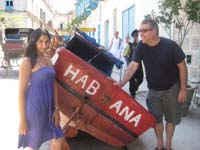
Over the past year Sarah Aroeste & Cuban-born musical collaborator, Roberto Rodriguez, have teamed up to create a project of all original, Sephardic-inspired, Cuban-infused music.
After recently returning from performing together in Havana, Cuba, this unique musical collaboration has taken off, but it needs your help!
In addition to developing their own music of original Cuban-Sephardic songs, Aroeste & Rodriguez are committed to helping promote Cuban Jewish life by working to build a Jewish Music Library based in Havana.
Continue reading "Sarah Aroeste—Roberto Rodriguez Cuban-Sephardic Music Project" »
From Joel Bresler, the go-to person on Sephardic discography:
Dear Friends:
 I am very pleased to announce the launch of my site, www.sephardicmusic.org. The site chronicles the first 100 years of commercial Sephardic recordings. It includes survey articles on the 78 and modern eras, a comprehensive discography of Sephardic 78s, and a sample of what a future discography of modern-era recordings could look like.
I am very pleased to announce the launch of my site, www.sephardicmusic.org. The site chronicles the first 100 years of commercial Sephardic recordings. It includes survey articles on the 78 and modern eras, a comprehensive discography of Sephardic 78s, and a sample of what a future discography of modern-era recordings could look like.
I have tried to take advantage of the web's multimedia capabilities to expand well beyond the normal contents of a discography (artist, title, place and date recorded, etc.) Wherever possible, I include label graphics and sound samples. A Union Catalog feature shows which public institutions own a particular recording, and I have normalized the songs' titles so that users can find all versions of any given song. Last, I have included information on the labels that published these recordings, the artists that made them, and the stores that sold them. I would welcome your comments.
Thank you for your help and support over the past decade.
Cordially,
Joel Bresler
sephardicmusic.org
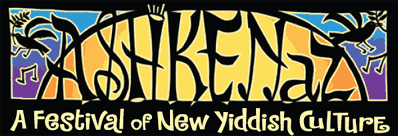
For 13 years Ashkenaz has brought the finest
in Yiddish and Jewish culture to Toronto.
To celebrate our ‘Bar Mitzvah’ year we
have assembled a diverse and exciting
festival lineup featuring more than
70 performances and 200 individual
artists from a dozen countries. From
music, dance, theatre, and film, to visual
arts, literature, discussions, kids and
family activities, and group celebrations
like Havdallah and our famous Parade,
Ashkenaz offers a wealth of artistic and cultural
experiences for all the senses.
The intermingling of tradition and innovation
has always been the hallmark not just of the
Ashkenaz Festival, but of the global Jewish
community. This year, Ashkenaz once again
presents a mix of traditional arts along with
multicultural fusion bridging communities
and artistic traditions from within and
beyond the Jewish world. And while
contemporary Klezmer music and
Yiddish culture remain at the heart
of our programming, we are thrilled
this year to offer more Sephardic
music and culture than ever before.
In short, Ashkenaz offers something
for everyone, a multi-cultural, multigenerational
experience for Jews and non-
Jews alike.
Judith Cohen writes to the Jewish-Music list about her travels.
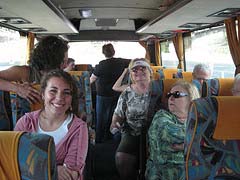 hi, well, it wasn't called LadinoBus, but that's what it was—I'm just back in Madrid from a couple of weeks hanging out on a bus careening through Turkey with a bunch of Sephardim mostly in their 70s and 80s, speaking Ladino (which is what most of them have resignedly taking to calling it these days; it isn't what any of them said at home) and visiting the cities they or their parents were born in; then a week in Bulgaria mostly with Sephardim as well, in their case mostly resisting the use of the term "Ladino" ("we don't care what they've decided in Turkey or Israel; Ladino isn't what is spoken"). I was on the Turkey trip as a sort of domesticated ethnomusicologist, and it was quite fascinating to see what memories of songs (and stories, recipes, proverbs etc ) the trip stirred up, between the places themselves, the interaction with others on the bus, and the interaction with Sephardim who had stayed in these cities all along.…
hi, well, it wasn't called LadinoBus, but that's what it was—I'm just back in Madrid from a couple of weeks hanging out on a bus careening through Turkey with a bunch of Sephardim mostly in their 70s and 80s, speaking Ladino (which is what most of them have resignedly taking to calling it these days; it isn't what any of them said at home) and visiting the cities they or their parents were born in; then a week in Bulgaria mostly with Sephardim as well, in their case mostly resisting the use of the term "Ladino" ("we don't care what they've decided in Turkey or Israel; Ladino isn't what is spoken"). I was on the Turkey trip as a sort of domesticated ethnomusicologist, and it was quite fascinating to see what memories of songs (and stories, recipes, proverbs etc ) the trip stirred up, between the places themselves, the interaction with others on the bus, and the interaction with Sephardim who had stayed in these cities all along.…
Photos of the trip are available on Flickr
Continue reading "On the LadinoBus with Judith Cohen in Turkey" »
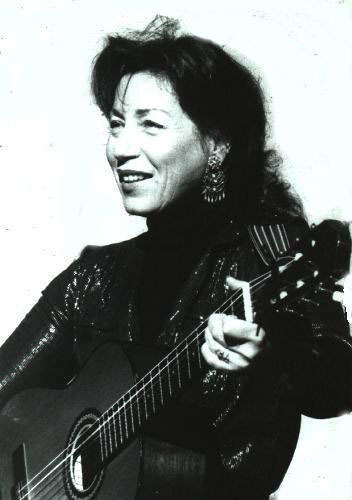 Sephardic singer Judy Frankel died of cancer on March 20, 2008. Judith Cohen immediately wrote a remembrance, but I had no time to get it online before departing for travels to Israel. Frankel's role in documenting the music and making it available was tremendous, so with great pleasure, I have finally uploading Dr. Cohen's Remembering Judy Frankel
Sephardic singer Judy Frankel died of cancer on March 20, 2008. Judith Cohen immediately wrote a remembrance, but I had no time to get it online before departing for travels to Israel. Frankel's role in documenting the music and making it available was tremendous, so with great pleasure, I have finally uploading Dr. Cohen's Remembering Judy Frankel
From Flory Jagoda:
Please join me for a splendid afternoon of Jewish Sephardic music on
Sunday, April 6, 2008 at 4:00 pm.
The one hour concert will be at Congregation Etz Hayim, the synagogue that has been my religious home since I first came to America in 1946.
I was born in Sarajevo, Bosnia. Before the madness of the Second World War, 14,000 Jewish people called Sarajevo home and it was known throughout Europe as /Chico Yerushalayim/ (Little Jerusalem) for its thriving Sephardic community. Today, sadly, there are only 160 Jewish survivors living there and most of them are elderly and ill.
They need our help and I am committed to sending them the help that they need.
To Buy Tickets and/or make a donation, please contact:
Congregation Etz Hayim, 2920 Arlington Blvd, Arlington, VA 22204
703.979.4466 / fax: 703.979.4458
www.etzhayim.net
Checks can be made to: Congregation Etz Hayim - Sarajevo Benefit Fund
Tickets are $20, with a discount of $5 off for seniors and students.
Children 12 and under are free. Please reserve your tickets in advance by March 31st .
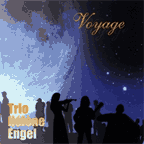 I have been slowly gathering in reviews written by Keith Wolzinger over the last few months. There are many more to come, but in the meantime, check out his wide-ranging examination of the post-klezmer sounds of The Lithuanian Empire, country-Jewish Mare Winningham / Refugee Rock Sublime, Yiddish folk and theatre songs from Hy Wolfe / Yiddish Songs for the Soul, world Jewish music by Montrealer Hélène Engel Trio / Voyage, and new Jewish sounds of another Montrealer, Shelley Posen / Menorah.
I have been slowly gathering in reviews written by Keith Wolzinger over the last few months. There are many more to come, but in the meantime, check out his wide-ranging examination of the post-klezmer sounds of The Lithuanian Empire, country-Jewish Mare Winningham / Refugee Rock Sublime, Yiddish folk and theatre songs from Hy Wolfe / Yiddish Songs for the Soul, world Jewish music by Montrealer Hélène Engel Trio / Voyage, and new Jewish sounds of another Montrealer, Shelley Posen / Menorah.
Eva Broman found these clips:
I just found some really nice clips on youtube. The first one is "Divahn" performing Avihu Medina's "Shabechi Yerushalayim":
And some of my favourite Israeli artists, the comedy/singing combo "Ma Kashur?" together with Sharif in a real "hafla" tune: And something totally different, from another era in Israeli music and television (Yigal Bashan, singing "Yesh li Tsipur K'tana b'lev" (I've a small bird in my heart)): I fell for this song when I first heard it in the movie "Bikur Ha-Tizmoret" with a group of Israeli friends. It must be something of a classic, because all the Israelis instantly recognized it and hummed along. "Bikur Ha-Tizmoret" is highly recommended, BTW. There is some excellent acting, and a warm, understated humour.From Daniel Halfon:
 I want to draw attention to you the release of 'Kamti Lehallel' a Double CD album featuring the music of the Spanish & Portugese communities of Amsterdam, London and New York.
I want to draw attention to you the release of 'Kamti Lehallel' a Double CD album featuring the music of the Spanish & Portugese communities of Amsterdam, London and New York.
For more information: www.bh.org.il/Music/catalogue.aspx#kamti
Eva Broman writes to the Jewish-Music mailing list:
In connection to the posts concerning the CD "The Diwan of The Jews from Central Yemen", I'd like to recommend another CD ("Their star will never fade") which features two very important Jewish-Iraqi musicians, Daoud and Saleh Al-Kuwaity. This is classical Arab music, composed and beautifully performed by the Al-Kuwaity brothers. I ordered my copy from israel-music.com, but I'm sure Hatikvah has it as well. Daoud's grandson, Dudu Tassa, is more of a modern rock musician, though I think that he has recorded some traditional Iraqi songs as well, like this one:
Continue reading ""Their star will never fade" Daoud and Saleh Al-Kuwaity" »
Simon, of Hatikvah Music, writes:
We have just received a 6 CD set of The Jerusalem Sephardi Baqqshot (Iraqi tradition).
This set includes a 100 page book in Hebrew and English.
Available now at $49.98 + $5.00 shipping within the US.
Thank You
Hatikvah Music
(323) 655-7083
Joel Bresler spotted this one:
Lost Language of Ladino Revived in Spain, by by Jerome Socolovsky
Morning Edition, March 19, 2007—Medieval Spanish Jews spoke Ladino, or Judeo-Spanish, for centuries. Now a small group is trying to revive Ladino, with assistance from the Spanish government. http://www.npr.org/templates/story/story.php?storyId=8989551
Julie Sulbrin writes of a recent podcast she produced for Nextbook. La Nona Kanta. The podcast was uploaded Jan 8, 2007.
Growing up in the Bosnian village of Vlasenica, Flory Jagoda spent her afternoons and evenings singing with her family—everyone sang, her grandmother, her aunts, uncles and cousins. Though they'd lived in the Balkans for centuries, their songs were in Judeo-Spanish, or Ladino, passed down from the time of her ancestors' expulsion from Spain. ... [more]
Tzadik recordings artists Davka have been working on an interesting fusion of new Jewish music for a decade, fusing classical training and traditions with klezmer, yiddish, sephardic, and middle eastern sounds. A few years ago they appeared at the Berkeley Jewish Music Festival with an amazing women's Balkan chorus, Kitka. I have been a fan of the latter almost since their inception in 1979 and treasure my cassette copy of their first release. In a PBS special that aired in December 2006, the two groups appeared together, again. There are also some interviews with members of the two ensembles about Jewish music and what it is to them. Kitka performs a wide variety of Jewish, primarily Sephardic music, while Davka also delivers a very nice live performance. They close with a few numbers together and are joined by Cantor Stephen Saxon (KlexX). It's a lovely program. If your PBS station hasn't yet aired it, encourage them to do so. Or, purchase a DVD (more interviews, songs) yourself.
For more information, visit the filmmakers' website, www.forestcreatures.com

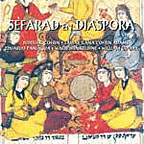 Judith R. Cohen / Sefarad en Diáspora, Pneuma, 2006 PN-780.
Judith R. Cohen / Sefarad en Diáspora, Pneuma, 2006 PN-780.
Ordering information: Karonte Distribution, Avda. Alfonso XIII Nr. 141, E-28016 Madrid.
Fax: +34 91 350 3358.
Available from Casa de Jacob's (they're in alphabetical order by CD title - scroll way down,
or, apparently from HMV in the UK
A new CD from Judith Cohen is always a treat. Her recent albums have been primarily, but never exclusively, Sephardic folk songs. In this latest outing she has assembled a wonderful ensemble featuring Wafir Sheikh and Bill Cooley. Her daughter, Tamar Adams, has also matured vocally, and is a greater delight with every recording. The call response on "Romance Hermanas Reina y Cautiva," accompanied by solitary kanun(?) is wonderful.
On this CD, Cohen is focused on the Sephardic diaspora, and the way that songs and melodies travel. Sometimes one changes, sometimes the other; sometimes all that is left is the theme. What unites them on this recording is wonderful singing and playing. We hear two variants on the shabbes song, L'cha dodi. And then there is "Romance de la Vuelta", the familiar story of the faithful woman awaiting her soldier, gone for seven years. In the seven very different variants here (Moroccan to French to Italian to Turkish...), as, here, in "John Riley", after testing her faithfulness, he reveals that he has returned. In other variants, she is told that he is dead. A very gloomy song in some versions, but the singing and instrumental playing make them all worth hearing, whether it is the supposedly happy ending of damsel first tried by her alleged lover, or the sadder versions. [GRADE: A]
Inspired by Flory Jagoda's wonderful new album, Sephardic music expert and performer Judith Cohen has sent us a slew of reviews about recent significant recordings:
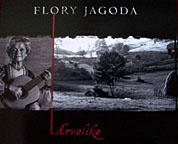 This is the one that started the recent round of writing: Flory Jagoda / Arvoliko. Cohen says that it is very, very good. Jagoda, of course, is a national treasure (and has the medal to prove it ;-)). Here she shows that she is still engaged with writing new songs about current life and politics. No "Ocho kandelikos" here. That's already been done.
This is the one that started the recent round of writing: Flory Jagoda / Arvoliko. Cohen says that it is very, very good. Jagoda, of course, is a national treasure (and has the medal to prove it ;-)). Here she shows that she is still engaged with writing new songs about current life and politics. No "Ocho kandelikos" here. That's already been done.
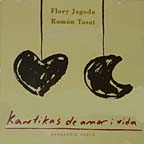 Here's another recent Jagoda release, this one with under-rated Argentinian singer, Ramón Tasat: Flory Jagoda and Ramón Tasat
/ Kantikas de amor i vida: Sephardic Duets. Another Tasat album, "Teshuva," by Tasat with César Lerner and Marcelo Moguilevsky was reviewed in 2004 by Sam Weiss.
Here's another recent Jagoda release, this one with under-rated Argentinian singer, Ramón Tasat: Flory Jagoda and Ramón Tasat
/ Kantikas de amor i vida: Sephardic Duets. Another Tasat album, "Teshuva," by Tasat with César Lerner and Marcelo Moguilevsky was reviewed in 2004 by Sam Weiss.
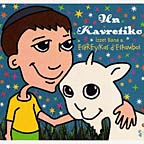 But wait, there's more! Izzet Bana & Estreyikas d'Estambol / Un Kavretiko, 2005, brings us a review of a delightful children's album.
But wait, there's more! Izzet Bana & Estreyikas d'Estambol / Un Kavretiko, 2005, brings us a review of a delightful children's album.
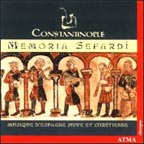 Less successfully, the excellent "Constantinople" ensemble tackled Sephardic music in 2001 with something that is beautiful as music, but perhaps not particularly connected to "Sephardic": Constantinople / Memoria Sefardí / Musique d'Espagne juive et chrétienne.
Less successfully, the excellent "Constantinople" ensemble tackled Sephardic music in 2001 with something that is beautiful as music, but perhaps not particularly connected to "Sephardic": Constantinople / Memoria Sefardí / Musique d'Espagne juive et chrétienne.
Simon, from Hatikvah Music, writes:
In the current on line issue of The Jewish Week, George Robinson reviews a number of new Jewish CDs at this site: www.thejewishweek.com/news/newscontent.php3?artid=11727
The reviews include:
Yinon Muallem: “Klezmer for the Sultan” (Oriente)
Muallem is an Israeli-born percussionist now living in Istanbul. He offers an
interesting mix of Turkish and Jewish traditional music, with a slightly pop
edge. Like so much “world beat” fusion music, this is very pleasant listening,
if not as adventurous as it could be.
Polskie Tango, 1929-1939 (Oriente)
A fascinating anthology of tangos from the 1930s, when that sensual music
seems to have been the rage everywhere, not just in Buenos Aires. Many of the
most popular tango players in Poland were Jewish artists, amply represented on
this set, and one can hear the dual influences of Argentine and Jewish music on
several of the recordings. Uneven, as most anthologies are, but historically
valuable and generally musically satisfying.
Participants on the Jewish-Music mailing list have long known Joel Bresler, whose exhaustive attempts to catalog and collect Sephardic music (and general mensh-dom) make him a wonderful resource. Now, Catherine Madsen has written about his work for the National Yiddish Book Center's magazine, Pakn Trager. Since the NYBC does not put the entire magazine online, Madsen and Bresler allowed me to make this article of extreme interest to KlezmerShack readership available here:
In Search of Sephardic Music, by Catherine Madsen, from Pakn Treger, Summer 2005/ 5765 (Number 48)
Four new reviews on the KlezmerShack:
 Freylach Time!, based in the Research Triangle area of North Carolina is a tradtional klezmer gem. It is also a community treasure. Now that the band has finally recorded, you can hear for yourself: Freylach Time! / The Klezmer Dance Band
Freylach Time!, based in the Research Triangle area of North Carolina is a tradtional klezmer gem. It is also a community treasure. Now that the band has finally recorded, you can hear for yourself: Freylach Time! / The Klezmer Dance Band
 London's Oi Va Voi has been impressing audiences from the UK to KlezKamp and everywhere in between for years. Whatever they are playing, it isn't klezmer any more, except insofar as it gets people up to dance. This new album, "Laughter Through Tears" just made the New York Time's "10 Best" list for 2003. For a change, I agree!: Oi Va Voi / Laughter Through Tears
London's Oi Va Voi has been impressing audiences from the UK to KlezKamp and everywhere in between for years. Whatever they are playing, it isn't klezmer any more, except insofar as it gets people up to dance. This new album, "Laughter Through Tears" just made the New York Time's "10 Best" list for 2003. For a change, I agree!: Oi Va Voi / Laughter Through Tears
 César Lerner and Marcelo Moguilevsky are two amazing musicians from Argentina. I've seen them perform in the UK and Canada. Now you can year why audiences love them and their brand of passionate klezmer infused with South American jazz. The new album, Sobreviviente, is live: Lerner Moguilevsky Duo / Sobreviviente
César Lerner and Marcelo Moguilevsky are two amazing musicians from Argentina. I've seen them perform in the UK and Canada. Now you can year why audiences love them and their brand of passionate klezmer infused with South American jazz. The new album, Sobreviviente, is live: Lerner Moguilevsky Duo / Sobreviviente
 A year with a new release from the Klezmer Conservatory Band is a good year. This latest contains many new gems - more than a taste of paradise: Klezmer Conservatory Band / A Taste of Paradise
A year with a new release from the Klezmer Conservatory Band is a good year. This latest contains many new gems - more than a taste of paradise: Klezmer Conservatory Band / A Taste of Paradise
There never seems to be time to review everything I'd like to write about. When music this good arises, I find myself listening over and over and forgetting to move on. That's okay. That's why I listen and write in the first place. So, from Australia to Ireland via California and Salonika via NYC, here are the latest. If you are getting an early start on your Chanuka shopping this coming weekend, pay good attention - these are the new musics that folks will be wanting:
 The Fig Tree, 2003
The Fig Tree, 2003
This is a delightful collection of Greek, Jewish, and other music, accompanying a book on immigrants to Australia by Arnold Zable. Don't let the distance from Australia stop you from listening to this, hearing the latest from our favorite Australian klezmer bands, and hearing some wonderful other music, as well.
 CeiliZemer / Shalom Ireland, 2003
CeiliZemer / Shalom Ireland, 2003
Continuing the international tour, this soundtrack to a documentary about Jews in Ireland fuses the two musics delightfully. Yes, indeed, think of what hasidic music (and klezmer) might have been like if the uillean pipes had been available in Eastern Europe. There's still time to add them here.
 David Chevan / Days of Awe, 2003
David Chevan / Days of Awe, 2003
Chevan has gathered his Afro-Semitic Experience, including guitar wizzard Stacy Phillips, and added Frank London. The result is exquisite jazz versions of music from the High Holy Days. If you like this sort of thing (I do), this is definitely the sort of thing that you will like.
 Margot Leverett & the Klezmer Mountain Boys, 2003
Margot Leverett & the Klezmer Mountain Boys, 2003
Today's theme seems to be fusion music. You got yer Greeks and Klezmers; you got yer Irish and Klezmers. And when you're especially lucky, you got your bluegrass klezmers. But, it's a Margot Leverett album, so you already knew that it would be on your "essential klezmer" list, anyway. I think of Leverett the way I think of Jeff Warschauer and Deborah Strauss - if she's involved, it's not only amazing, but it's comfort music - the perfect accompaniment for when you feel great, and an even better accompaniment for when you need a lift.
 Sarah Aroeste / A la una, 2003
Sarah Aroeste / A la una, 2003 Solomon & Socalled / HipHopKhasene, 2003
Solomon & Socalled / HipHopKhasene, 2003
As much fun as I had writing about everything else, this is my favorite of the bunch. Witty, brilliant, funny, and great music. The album features not only the amazing Socalled, but Oi Va Voi's Sophie Solomon. Guests include David Krakauer, Zev Feldman, Frank London, Michael Alpert, Elaine Hoffman-Watts and daughter Susan... even Jewish-music mailing list regular, Cantor Sam Weiss. Essential for all but the humor-impaired.
 This highly anticipated song book by Sephardic singer/composer/guitarist, Gerard Edery, contains 40 musical gems from the Sephardic oral tradition. Includes ballads, songs of courtship, love and marriage, as well as liturgical pieces honoring Elijah the Prophet, Abraham and Moses, among others. The song book also includes a 17 track accompanying CD, Ladino pronunciation guide, lyrics and translations, and a forward by renowned author/storyteller, Peninnah Schram. The songs are arranged in an easily readable format that highlights melody and guitar chords with suggested accompaniments.
This highly anticipated song book by Sephardic singer/composer/guitarist, Gerard Edery, contains 40 musical gems from the Sephardic oral tradition. Includes ballads, songs of courtship, love and marriage, as well as liturgical pieces honoring Elijah the Prophet, Abraham and Moses, among others. The song book also includes a 17 track accompanying CD, Ladino pronunciation guide, lyrics and translations, and a forward by renowned author/storyteller, Peninnah Schram. The songs are arranged in an easily readable format that highlights melody and guitar chords with suggested accompaniments.
This collection includes both familiar and lesser known pieces such as Montañas Altas, Shalom Alechem Señores, La Roza Linda, Cuando El Rey Nimrod, La Comida La Mañana, Eli Eliyahu, Tus Cavellos Seda Son, Dúrmite Mi Alma and many more!
To learn more about the song book and to order, please visit www.gerardedery.com/BOOK/HTML/book.html or contact Thia Knowlton directly at:
Sefarad Publishing
392 Central Park West
Suite 17Y
New York, NY 10025
Phone/Fax: (212) 662-9712
management@sefaradrecords.com
www.sefaradrecords.com
George Robinson announces a slew of new music columns published almost all together in New York's Jewish Week:
Five-Star Klez: From New Orleans and Odessa, fusion and traditional approaches.
A Fall Sampler: From Solomon Rossi to Michael Strassfeld.
Heard Around The World: From Turkey to London to the Lower East Side.
In response to a query to the Jewish-music mailing list, Barry Mehler posts the following to the the list:
If you click on the below link and then click on the text of Mizmor leDavid you will find a recording of an excellent example of the Western Sefardic Music Tradition. This melody of Mizmor leDavid was composed on commission for the Portuguese Synagogue in Amsterdam just after the turn of the (20th) century by Victor Schlesinger.
Applogies for the distortion in the recording caused by the compression.
I only got to two of the brand new recordings this weekend, partly because I've had trouble putting away some of the CDs that were sent last year. It's time. It's certainly time to spread the word.
 Anyone who has watched him perform, or more broadly, who has seen Claudia Heuermann's "Sabbath in Paradise," which covers the New York downtown Jewish music scene, is familiar with Coleman's work. His recordings with Sephardic Tinge--Coleman accompanied by bass and drums--present him at his most accessible and, I think, most lyrical. Last year's Our Beautiful Garden Is Open is an excellent example.
Anyone who has watched him perform, or more broadly, who has seen Claudia Heuermann's "Sabbath in Paradise," which covers the New York downtown Jewish music scene, is familiar with Coleman's work. His recordings with Sephardic Tinge--Coleman accompanied by bass and drums--present him at his most accessible and, I think, most lyrical. Last year's Our Beautiful Garden Is Open is an excellent example.
 I remember being amused by the name, "Orient Express Shnorer Klezmers" or something--a French klezmer band that seemed interesting, but I never had time to write a review. Now they have evolved into an incredibly articulate, brassy klezmer jazz ensemble. This tribute to Jewish food is a perfect introduction. Remember, when terrorists put a bomb in Paris back in the mid-eighties, it was a Jewish deli that was bombed. This is French Jewish food. Food matters. Delicatessen
I remember being amused by the name, "Orient Express Shnorer Klezmers" or something--a French klezmer band that seemed interesting, but I never had time to write a review. Now they have evolved into an incredibly articulate, brassy klezmer jazz ensemble. This tribute to Jewish food is a perfect introduction. Remember, when terrorists put a bomb in Paris back in the mid-eighties, it was a Jewish deli that was bombed. This is French Jewish food. Food matters. Delicatessen
 This is simply a pleasure. One of the most beautiful Sephardic albums I have heard in a while. Lovingly documented, beautifully sung by Hadass Pal-Yarden. Yahudice
This is simply a pleasure. One of the most beautiful Sephardic albums I have heard in a while. Lovingly documented, beautifully sung by Hadass Pal-Yarden. Yahudice
 Yes, we have another name change. The band whose name was once preceded by "Shawn's", is now simply "Kugel." Be that as it may, here's another helping of everything from the Grateful Dead to Aleynu, in Finger Play
Yes, we have another name change. The band whose name was once preceded by "Shawn's", is now simply "Kugel." Be that as it may, here's another helping of everything from the Grateful Dead to Aleynu, in Finger Play
 This week's winner of the "another band that I would have happily hired for my own wedding" is KlezmerFest. The band includes a couple of members of Hasidic New Wave, but this is where they get down and make traditional Party Music.
This week's winner of the "another band that I would have happily hired for my own wedding" is KlezmerFest. The band includes a couple of members of Hasidic New Wave, but this is where they get down and make traditional Party Music.
Despite best of intentions, I couldn't stop listening to these four albums this weekend. So that's as many reviews as got done:
 I used to claim that the New Orleans Klezmer Allstars were the hardest working klezmer bar band in existence. They've gotten much better than that. And their mix of New Orleans funk and Jewish soul just gets better and better with Borvis.
I used to claim that the New Orleans Klezmer Allstars were the hardest working klezmer bar band in existence. They've gotten much better than that. And their mix of New Orleans funk and Jewish soul just gets better and better with Borvis.
 This is almost the Jewish equivalent of Gregorian Chant, just more recent, in tune with the music of the Ottoman Empire, and, well, very Jewish. Very well done, with very good notes: Maftirim.
This is almost the Jewish equivalent of Gregorian Chant, just more recent, in tune with the music of the Ottoman Empire, and, well, very Jewish. Very well done, with very good notes: Maftirim.
 If, like me, you thought that Adrianne Greenbaum's flute album, or the Duo Controverso albums were high points of the year, then this incredible collection of clarinet-accordion pieces based on perfect klezmer will be the next essential stop. Truly heymisher.
If, like me, you thought that Adrianne Greenbaum's flute album, or the Duo Controverso albums were high points of the year, then this incredible collection of clarinet-accordion pieces based on perfect klezmer will be the next essential stop. Truly heymisher.
 This is the best Klezmatics album since, oh, "Jews with Horns"? Ecstatic music, ranging from klezmer to hasidish to the edges of new Yiddish music, and words worth listening to, context worth considering. If you read the KlezmerShack, you've probably already got your copy. If not, time to Rise Up.
This is the best Klezmatics album since, oh, "Jews with Horns"? Ecstatic music, ranging from klezmer to hasidish to the edges of new Yiddish music, and words worth listening to, context worth considering. If you read the KlezmerShack, you've probably already got your copy. If not, time to Rise Up.
Judy Caplan Ginsburgh writes to the Jewish-music mailing list about this new recording:
 "It is
called Yahudice (the name for the Ladino language of the Jewish people in
Ottoman times). The CD presents Ladino repertoire that deals with urban
music from Istanbul, Izmir, Thessalonika, and Jerusalem. The songs have
been extensively researched by Hadass Pal-Yarden who is a singer and a
doctoral student of Ethnomusicology. She has painstakingly researched these
songs and preserved 14 of them on this CD in as authentic form as possible
using mostly Ottoman instruments and the typical clear, ornamental vocal
style of this music. Not only is the music on the CD lovely and an
historical record, but it comes with a book which contains 160 pages of
educational material about each song, its style, background, audio archival
sources, bibliography and discography)."
"It is
called Yahudice (the name for the Ladino language of the Jewish people in
Ottoman times). The CD presents Ladino repertoire that deals with urban
music from Istanbul, Izmir, Thessalonika, and Jerusalem. The songs have
been extensively researched by Hadass Pal-Yarden who is a singer and a
doctoral student of Ethnomusicology. She has painstakingly researched these
songs and preserved 14 of them on this CD in as authentic form as possible
using mostly Ottoman instruments and the typical clear, ornamental vocal
style of this music. Not only is the music on the CD lovely and an
historical record, but it comes with a book which contains 160 pages of
educational material about each song, its style, background, audio archival
sources, bibliography and discography)."
The recording is available now, although for outrageous postage to the US, from www.kalan.com. Simon, of Hatikvah Music, in Los Angeles, has announced that he hopes to be providing this to American customers in the near future.
 I got carried away. CDs were falling off the shelf, so I sat down this weekend and stayed sat down until I got several reviewed. We've got some great new Jewish music, some avant garde and jazz, some klezmer (lots of klezmer), some Sephardic and Mizrahi music, more klezmer and Yiddish folk.... That's not the whole gamut, but odds are that something in this weekend's stack will be just what you were looking for:
I got carried away. CDs were falling off the shelf, so I sat down this weekend and stayed sat down until I got several reviewed. We've got some great new Jewish music, some avant garde and jazz, some klezmer (lots of klezmer), some Sephardic and Mizrahi music, more klezmer and Yiddish folk.... That's not the whole gamut, but odds are that something in this weekend's stack will be just what you were looking for:

 Den Flygande Bokrullen / Tarrschwein, 2002, headbanger klezmer
Den Flygande Bokrullen / Tarrschwein, 2002, headbanger klezmerThere was considerable discussion about Levy on the Jewish-music mailing list. First off, there was some rejoicing that Levy is, in fact, performing the songs using traditional instrumentation, and the expected scorn at those who are so used to international folk music with guitar and sound-alikes, that they don't recognize tradition when they see it, second, of course, lots of people think that she sings like an angel, and third, there was some discussion about an event referred to in the article in which her father's field recordings were all destroyed after he died, because he didn't want his transcriptions argued with. This was felt to be cultural vandalism of a nasty sort. Want to know more? Check out the article and her recordings!
Here is the latest CD roundup by George Robinson:
www.thejewishweek.com/news/newscontent.php3?artid=7715
It may help alleviate the surprising lack of comments to my request for "favorite Passover CDs".
 It's about time, but we finally have a short review up of the marvellous recent CD by Laura Wetzler, Kabbalah Music
It's about time, but we finally have a short review up of the marvellous recent CD by Laura Wetzler, Kabbalah Music

"Kabbalah Music" CD Release Concert & Art Exhibit
Sisters Explore Jewish Mysticism through Music and Painting
Laura Wetzler in "Kabbalah Music: Songs of the Jewish Mystics" Sunday, March 9, 3pm at The Merkin Concert Hall, 129 W.67th St., NYC. Tickets $25. Call Box Office:(212) 501-3330, Special Guests: Alicia Svigals, violin (of the Klezmatics,) Amir Chehade & Robin Burdulis, mideast percussion; Scott Wilson, kanun; Maurice Chedid, oud. Set Design and Art Exhibit by Angela Milner.
In conjunction, "Kabbalah Music: Encaustic Paintings by Angela Milner" The Merkin Concert Hall Gallery, 129 W.67th St. NYC. March 9-April 1. Post "Kabbalah Music" concert reception and art opening in gallery. Gallery hours by appointment thereafter: (212) 307-1385.
Continue reading ""Kabbalah Music" CD Concert Art Exhibit, premiers Mar 9" »
Seth Rogovoy posts to the Jewish-music mailing list:
The new issue of Sing Out! Magazine (Vol. 47, No. 1, Spring 2003) with Irish-American fiddle Liz Carroll on the cover contains reviews by yours truly of Jewish music recordings by the Red Hot Chachkas, Laura Wetzler and the recent anthology of klezmer called KLEZfest put out by ARC Music.
Eventually, these reviews will be posted at my website.
Judith Pinnolis, a reference librarian who hosts the Jewish Music Web Center writes to the Jewish-music mailing list:
Many of you will be thrilled to learn that UC Davis, as part of the Digital Libraries Initiative, has mounted much of the archive online from the collections of Samuel Armistead, Joseph Silvanman and Israel Katz. Armistead, of course, did one of the largest bibliographies and collection of Sephardic materials, starting nearly 50 years ago. This is an online bibliography, but also a searchable database of recorded music, field recordings, oral history and oral literature. It is truly remarkable. There are transcripts to follow while you listen to the field recording excerpts! It's keyword searchable in Spanish. There are also extensive histories online and other explanatory notes and articles full text. Try it, it's incredible. This is for everyone interested in the Sephardic heritage.
Here's the URL. flsj.ucdavis.edu/home/
Judy-aren't-libraries-wonderful-Pinnolis
 In what I hope will be the beginning of a plethora of new reviews, as I catch up with the pile of CDs that has accumulated since before my wedding, I have the first five up. All of these are great albums, but I caution folks that this is still the tip of the iceberg. In any event:
In what I hope will be the beginning of a plethora of new reviews, as I catch up with the pile of CDs that has accumulated since before my wedding, I have the first five up. All of these are great albums, but I caution folks that this is still the tip of the iceberg. In any event:
Pharaoh's Daughter / Exile, 2002 -- this will blow your mind. Basya Schechter has gotten superlative reviews for previous albums, but this new album is even better.
The Red-Hot Chachkas / Family Album, 2002 -- I have been following Julie Egger since she formed her first band, post KlezKamp, in 1998. This album shows how good she, and the band are. It is a very exciting traditional klezmer album with a couple of excellent new tunes.
Vocolot / Heart Beat, 2002 -- my earliest memory of Linda Hirschhorn is her talking with a friend of mine, even before I moved to Berkeley (which is a major relocation ago) about her music. Here, she and her primarily a capella band, the Vocolot (how aptly named! "vocolot" is Hebrew for "voices") range all over the world for songs of spirit and beauty, as well as featuring some of Linda's newest compositions.
 Adrianne Greenbaum / FleytMuzik, 2002 -- I am awestruck, and am not going to waste further verbiage trying to describe what an amazing, beautiful, virtuosic album this is. If you like klezmer, or you like flute, or if you didn't know that you liked either, this will still be your favorite album for a long time.
Adrianne Greenbaum / FleytMuzik, 2002 -- I am awestruck, and am not going to waste further verbiage trying to describe what an amazing, beautiful, virtuosic album this is. If you like klezmer, or you like flute, or if you didn't know that you liked either, this will still be your favorite album for a long time.
Paul Shapiro / Midnight Minyan, 2003 -- this just arrived. I popped it on to the changer to check it out, and have had a hard time not leaving it on constant replay ever since. Shapiro works primarily with the familiar Conservative synagogue song that all bar mitzvahs of a certain age (and perhaps bar and bat mitzvahs to this day) will recall. But what he does with this music, and with other Jewish sources, is to take davening to a new level. This is spiritual music and jazz of the highest order. (Bet you never davened to a rhumba before!)
Every year, George Robinson pegs the best of the albums that he has reviewed. The Klezmershack is months behind, so I'm just getting this up now. Still, the choices are excellent, so any time is the right time to read them:
Lori Lippitz passed along this URL about Sephardic music to the Jewish-music list. Thought it might be of interest to KlezmerShack readers:
www.jchron.co.uk/news.asp?Page=53&Type=4&Record=19912
7-Feb-2003 Arts & Ents > Reviews
Klezmer it ain't
Jenni Frazer
There's far more to Jewish music than the sounds of the Eastern European shtetl. Jenni Frazer heads east.
Turn to the east and listen to the sounds of the Sephardim. This year's Jewish Arts Festival has some particularly choice examples of Sephardi music, including songs of passion and tragedy as celebrated by the Spanish-Jewish group, Los Desterrados.
Best greetings from Poland!
I am writing to you because I would like to inform you that we just released the CD called "Nedudai" by SHANI BEN-CANA. This is wonderful record of young talented musician who lives in Safed, Israel.
Continue reading "Wandering through Jewish tradition by BEN-CANAR: a new CD from OW" »
Judith Cohen has updated her Sephardic Music Bibliography. Having promised to get it online if she sent it to me, I was finally forced to do something about this main page and get this weblog thing going. But, forget that. This item is about the updated bibliography, which is great! Enjoy, and many thanks to Dr. Cohen.
Usually we avoid mentioning Hanukkah until the great secular Jewish holiday, Thanksgiving, has passed. But this year, that's when Hanukkah starts. Fortunately, Hip Hop Hoodios, our favorite Spanish-English bilingual Jewish rappers have released the best Ladino Hanukkah hip hop video to date. Forget that. This is the best Hanukkah video to date. It pinche rocks!
The latest reviews include Byrd/Chevan / This is the Afro-Semitic Experience, 2002; Tim Sparks / At the Rebbe's Table, 2002;Yankele / L'Esprit du klezmer, 2001; Howard Leshaw / Bronx Volume II: Yiddish on the Edge, 2001; Klezmaniacs (MA) / Sveet like herring vit potatoes, 2001; Amsterdam Klezmer Band / Limonchiki, 2001; Alain Chekroun & Taouifik Bestandji / Chants des Synagogues du Maghreb, 2000; Mark Levy / Bin ikhmir a shnayderl (I'm a little Tailor), 1999; Roy Nathanson & Anthony Coleman / I could've been a drum, 1997; Rabson, Mimi / Music, 2002.
Continue reading "Sephardic Songbook edited Saltiel, intro by Josh Horowitz" »